Remington Premier Bismuth Waterfowl 12 Gauge 3" #2 1.37 oz – 25rds – R20500 For Sale
$49.99
The Remington Premier Bismuth Waterfowl 12 Gauge 3″ #2 1.37 oz – 25rds – R20500 is a cutting-edge addition to Remington’s ammunition lineup, designed to enhance hunters’ range and effectiveness across various types of avian game. Utilizing HEVI BISMUTH, this ammunition features a higher density than steel, enabling it to achieve longer distances with greater energy retention for effective performance, even at extended ranges. The increased density supports the use of smaller shot sizes, resulting in a higher pellet count, which improves shot accuracy and success rates during hunts. Suitable for diverse hunting environments, from prairies to flooded timber, the Premier Bismuth offers impressive results on both upland game and waterfowl, all while providing excellent value. Enhance your hunting endeavors with the Remington Premier Bismuth Waterfowl and experience its superior impact firsthand.
Can you shoot bismuth at waterfowl?
Yes, you can use bismuth shot for hunting waterfowl. Bismuth is considered a non-toxic alternative to lead shot and is approved for waterfowl hunting in many areas. Always check local regulations to ensure compliance with specific rules regarding ammunition types.
Why are bismuth cartridges so expensive?
Bismuth cartridges are more expensive primarily due to the cost of the raw material. Bismuth is a less abundant metal compared to lead, which traditionally has been used in ammunition. Additionally, the production process for bismuth cartridges is more complex, as bismuth’s properties require specialized equipment and techniques to manufacture reliable and effective ammunition. Furthermore, environmental regulations restricting the use of lead in ammunition have driven the demand for alternative materials, such as bismuth, increasing their price. Finally, economies of scale also play a role, as bismuth ammunition is produced in smaller quantities compared to more common types like lead, resulting in higher per-unit costs.
Is bismuth better than lead?
The comparison between bismuth and lead depends on the context in which you’re evaluating them, as they have different properties and uses:
1. **Safety and Toxicity:**
– **Bismuth**: Generally considered safer and less toxic. It is often used in medical applications and cosmetics.
– **Lead**: Highly toxic, particularly affecting the nervous system and causing environmental and health issues. Its use is heavily regulated.
2. **Applications:**
– **Bismuth**: Used in pharmaceuticals (e.g., Pepto-Bismol), cosmetics, and as a lead substitute in certain alloys because of its low toxicity. Also used in some eco-friendly ammunition.
– **Lead**: Historically used in pipes, paints, and gasoline, but now mostly used in batteries, radiation shielding, and some types of solder. However, its use is restricted due to health risks.
3. **Environmental Impact:**
– **Bismuth**: Poses less environmental risk compared to lead and is considered environmentally friendlier.
– **Lead**: Known for its environmental contamination issues.
4. **Physical Properties:**
– **Bismuth**: Has a lower atomic number and density than lead, which can be advantageous or disadvantageous depending on the application.
– **Lead**: Higher density, making it useful for applications requiring weight or radiation shielding.
In many modern contexts, especially where health and environmental safety are concerns, bismuth might be considered “better” than lead. However, for applications requiring properties like high density and radiation shielding, lead may still be preferred. Ultimately, the determination of which is “better” depends greatly on the specific application and criteria being considered.
Is TSS better than bismuth?
Determining whether TSS (Tungsten Super Shot) is “better” than bismuth depends on the context and the criteria you’re considering. Both TSS and bismuth are popular choices for shotgun pellets, especially in hunting waterfowl and other game.
1. **Density and Performance**:
– **TSS**: Tungsten Super Shot is denser than bismuth, which generally means it retains more energy and has better penetration at longer ranges. This can make it more effective, particularly for hunting.
– **Bismuth**: While less dense than TSS, bismuth is still denser than steel shot, providing decent energy retention and a softer impact compared to steel.
2. **Cost**:
– TSS is typically more expensive than bismuth. If budget is a primary concern, bismuth might be the more practical choice.
3. **Environmental Impact**:
– Both TSS and bismuth are considered non-toxic alternatives to lead shot. However, some hunters might prefer bismuth due to its closer environmental properties to lead.
4. **Regulatory Considerations**:
– Both materials are generally approved for waterfowl hunting where lead is prohibited, but always check local regulations as they can vary.
Ultimately, “better” depends on your specific needs, including budget, hunting conditions, and personal preferences. TSS offers superior performance at a higher cost, while bismuth provides a more affordable, yet still effective, alternative.
Can I shoot bismuth through a full choke?
Yes, you can shoot bismuth through a full choke. Bismuth is softer than steel and similar in properties to lead, making it safe to use with most chokes, including a full choke. However, always follow the manufacturer’s recommendations and ensure your firearm is suitable for shooting bismuth loads.
What is the only legal gun that can be used to take waterfowl?
The only legal gun that can generally be used to hunt waterfowl is a shotgun. Specifically, it must be a shotgun that is no larger than 10 gauge, and it often needs to be “plugged” to only hold a maximum of three shells (including one in the chamber) in total. Regulations can vary by region, so it’s important to check local laws and regulations regarding waterfowl hunting.
Can you shoot bismuth in old shotguns?
Yes, you can shoot bismuth in old shotguns. Bismuth is softer and closer in density to lead, making it a suitable alternative for older shotguns that might be damaged by harder non-toxic shot options. However, it’s always a good idea to consult the manufacturer or a gunsmith to ensure compatibility with your specific firearm.
How much does a pound of bismuth cost?
As of the most recent data, the price of bismuth can vary due to market fluctuations and sources. Generally, the price ranges from $3 to $15 per pound. For the most current and specific pricing, it’s advisable to check with metal suppliers or financial markets specializing in commodities.
What size bismuth shot for geese?
For hunting geese, bismuth shot sizes ranging from BB to 2 are typically recommended. The larger shot size (BB) offers greater knockdown power, while the slightly smaller sizes (1 or 2) can provide denser patterns. The choice between these sizes may depend on your specific gun, choke, and hunting conditions.
Can you mix lead and bismuth?
Yes, lead and bismuth can be mixed to form an alloy. Bismuth is often added to lead alloys to improve certain properties, such as reducing the melting point and providing a sharper melting range. This makes the alloy useful in applications like low-melting-point solders and fusible alloys. The mixture generally combines well without significant issues, but the specific proportions and methods depend on the intended use of the alloy.
What size shot of bismuth to lead?
The size of bismuth shot compared to lead depends on what you are using it for, such as hunting or target shooting. Generally, bismuth shot can be used in a similar size to lead shot because it is a non-toxic alternative often used for waterfowl hunting. However, because bismuth is slightly less dense than lead, some shooters recommend using a shot size one size larger than what you would normally use for lead to match the downrange energy and effectiveness. Always make sure to check the specific regulations and recommendations for your area and intended use.
What is a cheap alternative to lead shot?
A cheap alternative to lead shot is steel shot. It is commonly used for hunting and shooting because it is more affordable than other alternatives like bismuth or tungsten, and is also considered more environmentally friendly due to the harmful effects of lead.
Can you shoot bismuth through Carlson choke tubes?
Yes, you can shoot bismuth through Carlson choke tubes. Bismuth is softer than steel, making it suitable for use with all types of choke tubes, including Carlson’s. However, it’s always a good idea to refer to the manufacturer’s guidelines to ensure compatibility and avoid any potential damage to your shotgun or choke tubes.
Is bismuth shot safe in old shotguns?
Using bismuth shot in old shotguns is generally considered to be a safer alternative to steel shot. Bismuth is softer and has a density closer to that of lead, which makes it less likely to cause damage to older shotguns. However, it’s important to check with the manufacturer or a gunsmith to ensure your particular shotgun can handle bismuth shot safely. Consider the condition of the shotgun and its chamber pressure limits, as older firearms may have different specifications and material strength compared to modern firearms.
What type of shot is illegal when hunting waterfowl in the US?
The use of lead shot is illegal when hunting waterfowl in the United States. Hunters are required to use non-toxic shot, such as steel, bismuth, or tungsten, to prevent environmental contamination and protect wildlife.
Be the first to review “Remington Premier Bismuth Waterfowl 12 Gauge 3" #2 1.37 oz – 25rds – R20500” Cancel reply
Related products
Remington Premier Bismuth Waterfowl
Remington Premier Bismuth Waterfowl 20 Gauge 3" #5 1.25 oz – 25rds – R20508
Remington Premier Bismuth Waterfowl
Remington Premier Bismuth Waterfowl .410 Gauge 3" #4 0.56 oz – 25rds – R20514
Remington Premier Bismuth Waterfowl
Remington Premier Bismuth Waterfowl 12 Gauge 3" #5 1.37 oz – 25rds – R20501
Remington Premier Bismuth Waterfowl
Remington Premier Bismuth Waterfowl 12 Gauge 2.75" #2 1.25 oz – 25rds – R20503
Remington Premier Bismuth Waterfowl
Remington Premier Bismuth Waterfowl 20 Gauge 2.75" #5 0.87 oz – 25rds – R20509
Remington Premier Bismuth Waterfowl
Remington Premier Bismuth Waterfowl 16 Gauge 2.75" #4 1.12 oz – 25rds – R20511
Remington Premier Bismuth Waterfowl
Remington Premier Bismuth Waterfowl 12 Gauge 2.75" #5 1.25 oz – 25rds – R20505
Remington Premier Bismuth Waterfowl
Remington Premier Bismuth Waterfowl 28 Gauge 2.75" #4 0.87 oz – 25rds – R20513
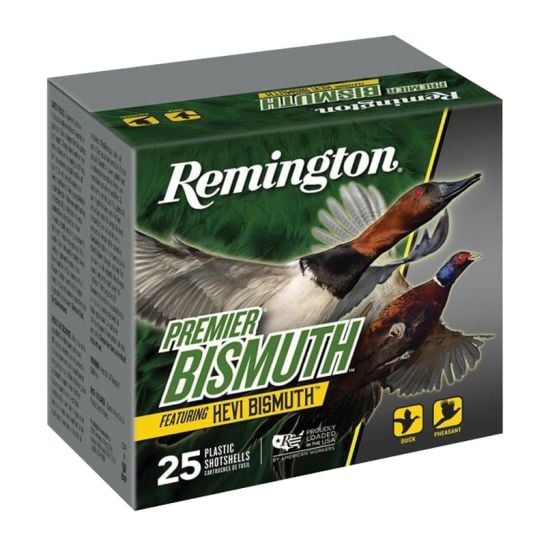
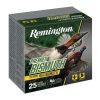
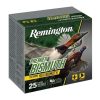
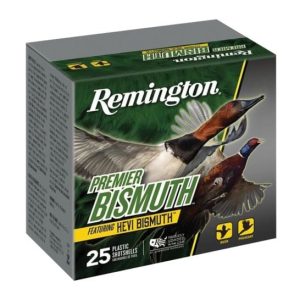
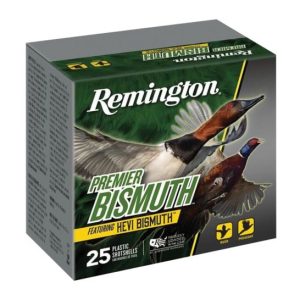
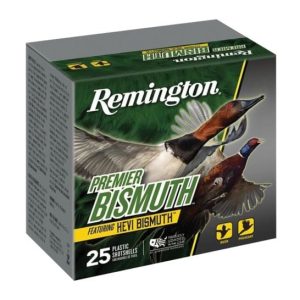
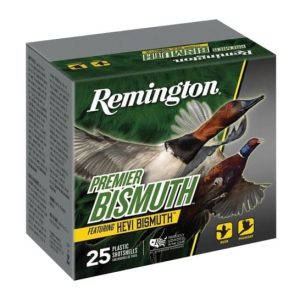
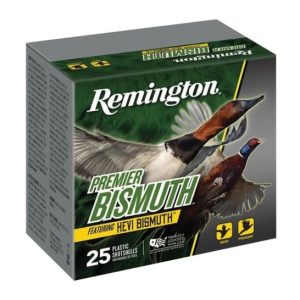
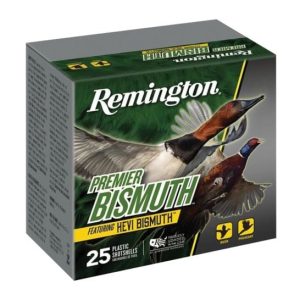
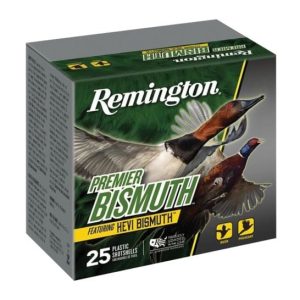
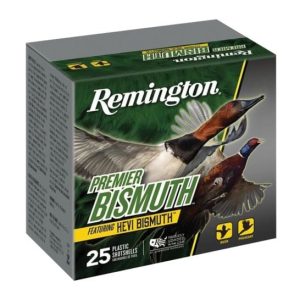
Reviews
There are no reviews yet.